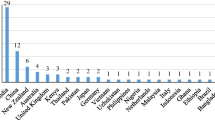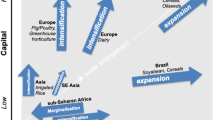Conclusions
From the arguments I have presented, I hope it is clear that the distinction between basic and applied research is tenuous. Certain areas of research and methods may be favoured over others because of intrinsic biases, which are predictive of the type of application possible. Believing in the neutrality of pure knowledge is like wearing blinders: scientists need not be too concerned about the way in which the knowledge they generate is used. In my own case, this belief led to my participation in a system of agriculture to which I do not subscribe. Scientists should be willing to take responsibility for how they function in the system as a whole. Given the social structure of science, it is difficult for basic researchers to see their connections with the larger issues, much less to control them. Perhaps new ways of constructing knowledge-generating societies will be necessary in order to encourage individual responsibility.
Similar content being viewed by others
Author information
Authors and Affiliations
Rights and permissions
About this article
Cite this article
Crouch, M. The very structure of scientific research mitigates against developing products to help the environment, the poor, and the hungry. J Agric Environ Ethics 4, 151–158 (1991). https://doi.org/10.1007/BF01980311
Issue Date:
DOI: https://doi.org/10.1007/BF01980311




